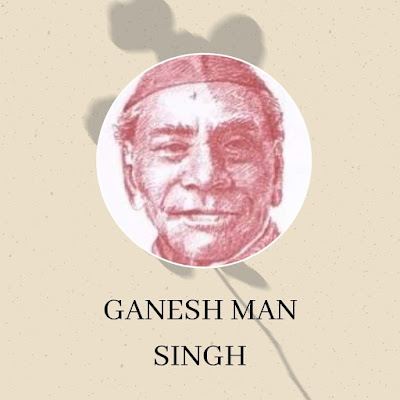Ganesh Man Singh: The iron man
Ganesh Man Singh is publicly acclaimed as all acceptable leader of democracy. It is a sign of respect that all the Nepalese show towards him that they call him supreme leader.
He was born to a well-to-do family on November 09, 1915 in Itumbahal, Kathmandu as the son of Gyan Man Singh and Sanunani Shrestha Singh. His father died when he was six. So, his grandfather Ratna Man Singh brought him up.
He studied in Darbar High School till grade six. When he was expelled from the school for not respecting his fellow students who were Ranas. He went to India to continue his studies. After completing his I.Sc. from Vidyasagar College, he returned to Nepal.
As soon as he returned to Nepal, he planned to protest against the autocratic rulers of Nepal. In 1940, he joined the Praja Parishad, the first political party in Nepal. Unfortunately he was arrested on October 18, 1940. Though he was sentenced to life in prison for anti-Rana activities, he ultimately escaped from Bhadragol Jail in 1944. After that he fled to India.
In 1949, he became one of the founding members of the Nepali Congress. Following this he played a significant role to overthrow the Rana Regime in 1950. In 1958, he became a cabinet minister. However, after the coup by late king Mahendra on 31st December 1960, he was arrested and kept at Sundarijal Military Detention Camp for eight years. Yet he refused to let his spirit be broken. Instead, he became one of the main leaders advocating democracy in Nepal after he was released on 30th October 1968.
He spent many years struggling against the partyless Panchayat System. Finally, he led the Nepalese Democratic Movement in 1990 which overthrew the Panchayat System. After the restoration of democracy, in 1990, he transcended above the party politics. Later he started working in favour of the nation and her people. Sadly, ‘the iron man’ died on September 18th, 1997 in Chaksibari, Kathmandu.
Ganesh Man Singh was awarded the United States Peace Run Prize in 1990. Moreover, he was the first Asian to be honoured with the United Nations Human Rights Award which he received in 1993. He was the first commoner to receive the State Funeral in Nepal.
Ways with words
1. Read the text above and fill in the gaps with correct words from the box.
supreme, leader, escaped, well-to-do, expelled, released, democracy
(a) There are many political parties in Nepal. We live in a multiparty ………….
(b) Everyone accepted Ganesh Man Singh as their leader during the Nepalese Democratic Movement in 1990. Therefore, he was known as the …………. of the Nepalese.
(c) Ratna Man Singh was Badakaji. He worked in the Rana's palaces. He had managed everything in his family. Ganesh Man Singh was born in such a ...… family.
(d) If students break school rules and regulations, they can be …………..
(e) Though he was sentenced to life in prison, he …………. from the jail.
Problem Solved
(a) There are many political parties in Nepal. We live in a multiparty democracy.
(b) Everyone accepted Ganesh Man Singh as their leader during the Nepalese Democratic Movement in 1990. Therefore, he was known as the supreme leader of the Nepalese.
(c) Ratna Man Singh was Badakaji. He worked in the Rana's palaces. He had managed everything in his family. Ganesh Man Singh was born in such a well- to-do family.
(d) If students break school rules and regulations, they can be expelled.
(e) Though he was sentenced to life in prison, he escaped from the jail.
2. Match the words in column 'A' with their meanings in column 'B'.
A B
(a) transcend (i) bringing back a system that existed previously
(b) coup (ii) to be or go beyond the usual limits of something
(c) restoration (iii) the funeral given by the government in honour of a great person
(d) advocating (iv) sudden and unlawful change of the government
(e) state funeral (v) supporting something publicly
Problem Solved
(a) transcend: to be or go beyond the usual limits of something
(b) coup: sudden and unlawful change of the government
(c) restoration: bringing back a system that existed previously
(d) advocating: supporting something publicly
(e) state funeral: the funeral given by the government in honour of a great person
Read and answer
1. Answer these questions.
(a) Who is Ganesh Man Singh?
(b) Where was he born?
(c) Where did he study?
(d) Why was he expelled from Darbar High School?
(e) Why did he join the Praja Parishad?
(f) Why was he sentenced to life in prison?
(g) When was the Panchayat System overthrown?
Problem Solved
1. Who is Ganesh Man Singh?
Answer: Ganesh Man Singh is a great leader of democracy.
2. Where was he born?
Answer: He was born on November 09, 1915.
3. Where did he study?
Answer: He studied in Darbar High School till grade six and completed his I.Sc from India.
4. Why was he expelled from Darbar High School?
Answer: He was expelled from Darbar High School because he didn’t respect his fellow students who were Ranas.
5. Why did he join the Praja Parishad?
Answer: He joined the Praja Parishad in order to protest against the autocratic rulers of Nepal.
6. Why was he sentenced to life in prison?
Answer: He was sentenced to life in prison because he protested against them which was considered as anti-Rana activity.
7. When was the Panchayat System overthrown?
Answer: The Panchayat System was overthrown in 1950.
2. Find what happened in the life of Ganesh Man Singh. Write a sentence for each date.
Date
Event that happened in his life
1. November 9, 1915
He was born on this day.
2. 1940
He joined the Praja Parishad.
3. October 18, 1940
He was arrested.
4. 1944
He escaped from Bhadragol Jail.
5. 1949
He became one of the founding members of the Nepali Congress.
6. 1950
He helped to overthrow Rana Regime.
7. 1958
He became a cabinet minister.
8. 1960
He was arrested for eight years.
9. 30th October, 1968
He was released from the jail.
10. 1990
He helped to overthrow the Panchayat System.
11. 1993
He was honoured with the United Nations Human Rights Award.
12. September18, 1997
He was dead.













0 Comments